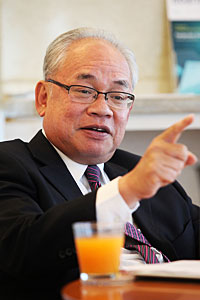
The shock, followed by knee-jerk reaction, over the election victory of Donald Trump by Asian financial markets may have faded as investors regained composure. Still, there are reasons for policy makers and businesses in Asia, Thailand included, to take note, reassess and make necessary preemptive moves to mitigate any risks that the new policy may imply.
Putting migration policy aside, two major policy shifts stand out that can have a far-reaching effect on the global economy and international trade.
The first is US fiscal policy. Mr Trump has proposed steps to "Make America Great Again" by loosening fiscal policy including tax cuts and larger infrastructure spending in a bid to boost employment and firm up US recovery. Up to now, because of its high level of public debt, approaching US$20 trillion or 90% of GDP as we write, the US has been remarkably disciplined on using fiscal policy to stimulate growth. It has relied mainly on monetary policy to "keep the patient alive" through very low interest rates and quantitative easing.
More fiscal spending would definitely be positive for growth in the short-term and could potentially prompt the US Federal Reserve to do more on monetary policy by raising the interest rate more actively as growth strengthens and inflation rises. But more spending would also mean more government borrowing, higher public debt and higher long-term interest rates going forward. Such outcomes could reignite concerns of financial markets over US debt serviceability, a similar problem to what occurred several years ago when increased indebtedness threatened a US default because of the statutory limit on new debt creation and rollover, shaking the confidence of global financial markets.
This time, loosening of fiscal policy could mean an erosion of fiscal discipline and softer controls on national debt creation, not least because the next US president will command a majority in the Senate and House of Representatives. My view is that lax fiscal policy, undisciplined debt creation and monetisation of such debt, if any, pose a serious risk that could create even bigger problems for US financial stability down the road. In the short-term, easier fiscal policy will undoubtedly bolster US growth and Asia will stand to benefit, in spite of persistent capital outflows from the region as US interest rates go up.
The second policy shift concerns international trade. Mr Trump has made it categorically clear where he stands on free trade. Short of volte-face, free trade deals like Nafta could face a major revamp, if not scrap, while the Obama-driven TPP could be dead in the water. The "America First" policy instead could trigger more protectionist measures, such as imposition of various trade barriers, discrimination and/or higher tariffs. This would threaten global trade growth at a time when it is already very weak, projected at 1.7% growth this year and 1.8% next year. This will lead to an even fiercer trade environment, to the detriment of most export-driven economies in Asia.
A related crucial area to monitor under a Trump administration is market regulation, especially a possible reversal or easing of regulation to help business and promote growth. My hunch is that such a move is highly probable given the Republican Party's long-standing support for a freer market coupled with the president-elect's own decades of entrepreneurship and business acumen which instinctively could see regulation as a hindrance to business.
In this regard, a key area to watch for is rules and regulation relating to the Dodd-Frank Act of 2010 that requires banks to do more on consumer protection and risk management and thus imposing huge compliance costs on banks. All this could be at risk of being compromised. Watering down such rules would mean a loosening of discipline and standards on bank oversight and supervision, encouraging sub-standard behaviour and posing more risk to financial stability as a result.
But that is not all. An even bigger issue we should all be concerned with regarding a Trump presidency is governance. Throughout modern history, we have seen numerous instances in which successful businessmen or businesswomen who having made their ways to the top of a political tree disappointingly failed at their jobs and instead created more problems simply because they continued to be businessmen and businesswomen while in public office.
The three major pitfalls have included conflict of interest such as failure to distinguish between personal and public interest; abuse of power or succumbing to the temptation of exploiting the power of the office for their own business interest; and obsession with power by exercising power in such a way as to undermine any mechanism of checks and balances that may have existed, turning an otherwise democratic leader into an authoritarian one.
All this has happened time and again the world over when business takes charge of politics. Would the US be any different? We can only hope that the president-elect is mindful of the mentioned pitfalls and does not fall prey to them. I wish him a successful administration and that he turns out to be a strong and charismatic leader that will lead the world out of the many problems that we have been facing, economic or otherwise.
